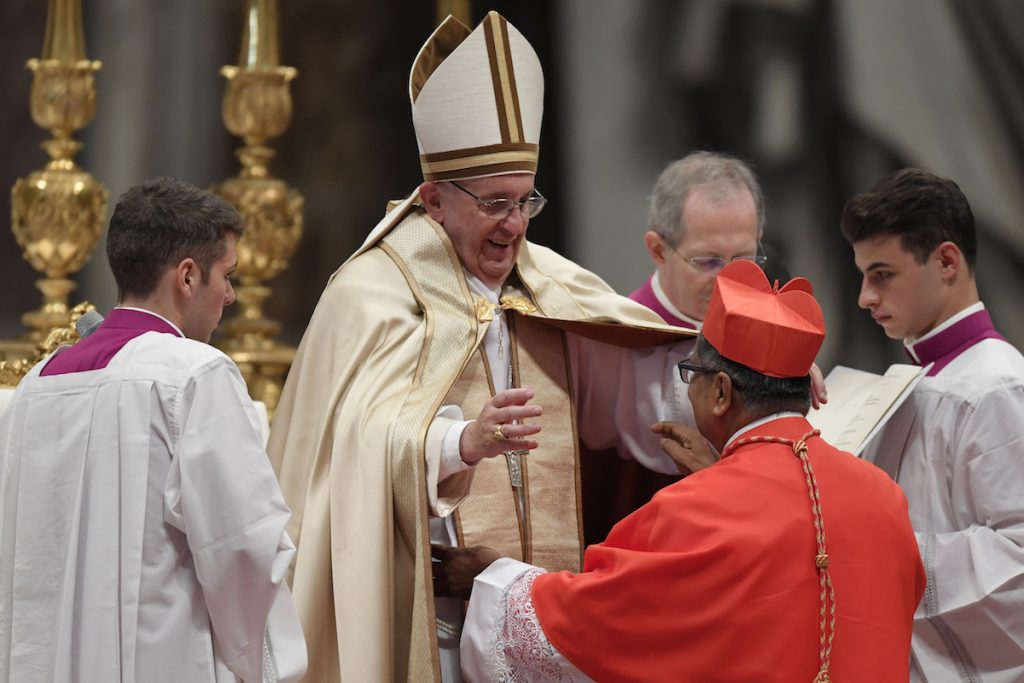Pope Francis sent a letter of condolences for the death of Cardinal Anthony Soter Fernandez of Kuala Lumpur, expressing “sadness” over the death of Malaysia’s Catholic Church leader.
In a letter to Archbishop Julian Leow Beng Kim of Kuala Lumpur, the pontiff expressed his “heartfelt condolences” as he prayed for the cardinal’s “eternal rest.”
The pope also expressed his gratitude for Cardinal Fernandez’s “faithful witness to the Gospel, his generous service to the Church in Malaysia and his longstanding commitment to the promotion of ecumenism and inter-religious dialogue.”
“To all who mourn the late cardinal’s passing in the sure hope of the resurrection, I cordially impart my apostolic blessing as a pledge of consolation and peace in Jesus Christ our Savior,” read the pontiff’s message.
Meanwhile, Cardinal Charles Maung Bo of Myanmar, president of the Federation of Asian Bishops Conferences (FABC), said that with the death of Cardinal Fernandez, “the Church has lost an illustrious son of Asia.”
“We grieve today with the Catholics of Malaysia, as they bid farewell their warm and affectionate Church leader,” said the prelate of Yangon.
“His eminence followed the great example of the Good Shepherd by knowing his flock intimately, infusing pastoral concern into his long mission,” added Cardinal Bo.
He said the FABC notes with gratitude Cardinal Fernandez’s “significant contribution to the Church in Malaysia and Asia.”
“His memory is one of a considerate and compassionate pastor, investing his energy in the deepening of the faith of the people, building systems and processes that promoted a Church affirming the Vatican II concept of people of God,” said Cardinal Bo.
Cardinal Fernandez, Malaysia’s first Catholic cardinal, died on Oct. 28. He was 88 years old.


Born on April 22, 1932, in Sungai Patani in the Diocese of Penang, Cardinal Fernandez was ordained into the priesthood in 1966.
He was appointed as bishop of Penang by Pope St. John Paul II in 1977 and archbishop of Kuala Lumpur in 1983, and made cardinal by Pope Francis in November 2016.
He was a priest for 53 years, a bishop for 42, and a cardinal for three years.
Cardinal Fernandez served as president of the Catholic Bishops’ Conference of Malaysia, Singapore and Brunei from 1987 to 1990 and then again from 2000 to 2003.
From 1981 to 1982, he was a member of the Office of Education and Student Chaplaincy of the FABC before it was renamed to the Office of Education and Faith Formation in 2008.
For five years, from 1984 to 1989, Cardinal Fernandez was with the Office of Human Development of the federation.
He was also known as an advocate and pioneer in promoting the use of the national language in the local Church “as a sign of our commitment to and love for our country.”
He said the Church must pay more attention to the local language and culture if it is to remain faithful to the post-Vatican Council II idea of inculturation.
He was the first bishop to use Bahasa Malaysia in his episcopal motto, “Keadilan dan Keamanan,” which means “Justice and Peace.”
Cardinal Fernandez had his early education in Klian Pauh Convent, Taiping, from 1940 to 1941.
His studies were disrupted by World War II, but he continued his education at St. Theresa School and Ibrahim School in Sungei Petani.
Following the death of his father in 1946, he had to put aside his studies and assume the role of bread winner for the family.
According to those who were familiar of the cardinal’s early years, his main priority was to care for his mother and to ensure that his younger brother would get a proper education.
He worked as a hospital assistant from 1947 to 1954.
He joined the minor seminary in Singapore in 1958 at the age of 26. He completed his priestly formation at College General in 1966 and was ordained to the priesthood by Bishop Dominic Vendargon on Dec. 10 of the same year.
His first assignment after ordination was as assistant priest and later parish priest at the Church of St. Louis in Taiping where he served for three years.
He later attended the International Training Institute for World Churchmen and the East Asian Pastoral Institute in Manila, Philippines.
In 1972, he attended the Intensive Training Institute at the National Biblical Catechetical-Liturgical Centre in Bangalore, India.
In 1973, he was appointed as a professor in College General to initiate students into the priestly life. When the post of rector became vacant in 1975, he was appointed rector.


